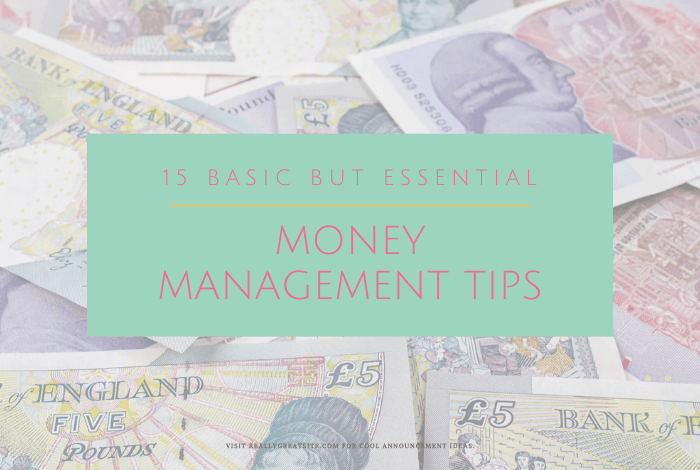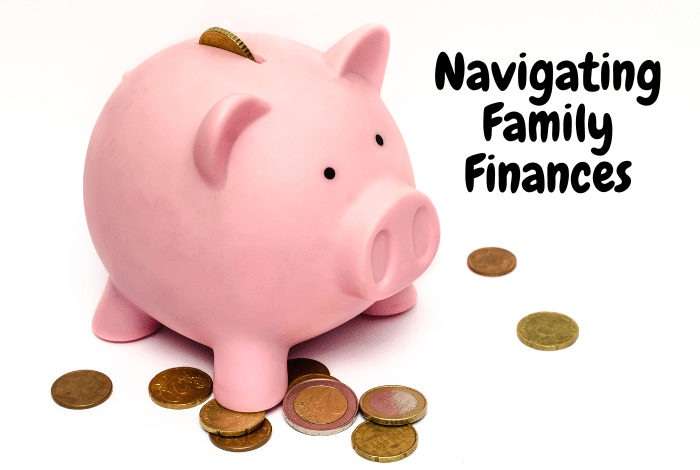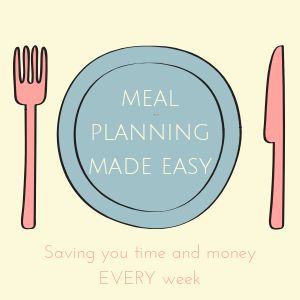We’re going back to basics today with these 15 basic but essential money management tips!

Over the last six months as my life has been ridiculously busy and if I’m honest, budgeting has probably been the last thing on my mind most of the time – manageable only because our outgoings were significantly less with the kids on lockdown at home and our income was significantly increased due to all of the overtime I was working.
Now we’re having to deal with the fact that this is our new normal and our outgoings are creeping back up while the overtime is on the decline so I don’t have the luxury of not thinking as much about our budget that I’ve had recently (a luxury we’ve been very grateful for) so now it’s time to get back to basics which is why I’ve put together this post full of money management tips that we can all use.
And yes, I absolutely get that some of them might be super basic but that was the idea behind this post really – I almost called it Money Management Tips for dummies. I think we all need to get back to basics every now and again so whether you’re a seasoned pro at money saving or you need to know the basics, this is the post for you!
You might want to grab a cuppa and a jammy dodger before you read it though – it’s a long one!
15 of my top money management tips
1 – Make sure you have a monthly budget!
This one is non-negotiable because if you don’t have a budget, how can you expect to manage your money and maximise what you have? Whether it’s knowing where you need to cut back, understanding if you have some spare money to invest, deciding how much you can afford to spend on your weekly shopping or how much you can put towards your debts to pay them off as quickly as you can or even working out if you can afford a little treat here and there. Think about what you can cut from your budget to make it that bit healthier!
Check out my free downloadable monthly budget planner or even my annual financial planner which you can start now rather than wait until January!
2 – Work out the best way to pay off your debts as soon as you can
Once you know your budget, you can see how much extra you can pay towards any debts that you have so you can be debt-free as soon as possible. Make it as easy as you can to send them a quick payment when you have some spare money so have payment details set up in your online banking so it’s literally a few clicks to make an extra payment. I know from experience that if I have to make much of an effort then I’ll often give up before doing it.
There’s a popular method that people use to pay off their debts quickly called snowballing which really works.
3 – Overpay your mortgage
I’m a huge fan of overpaying your mortgage and have mine set to automatically take around £150 extra a month as well as having the overpayment details stored in my online banking so I can pay little bits here and there.
Find out how I’m overpaying my mortgage here and how you can do the same here.
4 – Build up an Emergency Fund
OK, this is one that I can never seem to master as I always end up building up an emergency fund and then spending it on non-emergency things. It’s absolutely recommended that you have some money set aside to fall back on in case of an emergency and this year has been an emergency like no other for some people who were happily moving through their life not expecting anything like 2020 has thrown at us.
Here’s my last update on our Emergency Fund which is from a little while ago – I can tell you that currently, it’s absolutely non-existent.
5 – Build up your financial resilience
How would you cope if your boiler broke down? Or your car breaks down miles from home? Or your puppy needs an operation on his leg? I plan for this with various different insurances and policies to cover me if something happens but lots of people use sinking funds which are little savings ‘pots’ for all the things you might need.
6 – Always check your receipts and bank statements
Mistakes are made every day and the last thing you want is a mistake made with your money so check your receipts every time you buy something and always check your bank statements every month to make sure that everything is exactly as it should be. Here’s a post you might like to read about why I never used to check my bank statements and why I absolutely do now!
7 – Always look to see if there are ways that you can MAKE some extra money
I’m not talking a second job or income here (although that’s not a bad idea) but just a few minutes here and there each week on sites like Swagbucks and OhMyDosh will help you to gradually build up a balance that will absolutely help make you some extra money. I shared a few ideas here on how to do that in this post and honestly, if you start now you’ll have a good little amount built up for Christmas.
If you have the budget, investing in the stock market can be a great way to build up a bank of extra cash. Once you’ve found a stock you’re interested in such as PLS you can invest with a broker. Then all you have to do is monitor the PLS share price to see when it’s time to sell.
There’s also this series of posts where I wrote about different ways you can make £50 easily with not too much effort:
April – three ways for you to earn £50 in a month.
May – three ways for you to earn £50 in a month.
June – three ways for you to earn £50 in a month.
July – three ways for you to earn £50 in a month
8 – Always look to see if there are new ways that you can SAVE some money
There are so many ways that you can save money that I could genuinely be here for weeks and still not be done. A good place to start would be this post – 50 Ways to Save Money – which is jam-packed with ideas of easy and actionable ways to save money.
9 – Remember that Loyalty doesn’t pay. Unless it does.
So, loyalty absolutely doesn’t pay when it comes to most things that you think about when it comes to your monthly bills so you should always shop around for things like insurance policies, utilities and pretty much anything else in the outgoing section of your monthly budget. I wrote a bit in this post about how to use cashback sites to get the best deals.
Sometimes loyalty does pay though – the Boots Advantage Card is a prime example of this. I have the app on my phone so whenever I go in to buy something, I always jump on and make sure that I’ve loaded any offers that will get me some extra Advantage points and I often buy a couple of products at a time if it’ll get me extra points (only if it’s something I buy all the time so I’d be buying over time anyway if that makes sense). I don’t usually make a huge amount but I do save it through the year so at Christmas I can buy Miss Frugal the obligatory expensive perfume that she asks for without breaking the bank.
10 – Think about intentional spending
Intentional spending is all about saving in one area of your budget to spend in another. So, I might save on our weekly shopping budget to put money aside for my travel goals each year. We all have different reasons for wanting to save money so if you know what your ‘Why’ is then you might find it easier to stick to achieve your financial goals.
There are lots of things that I won’t give up to save money but that just means I need to cut back elsewhere to pay for them and it’s worth that cutting back to pay for something I love.
11. Always plan your meals
There’s not much I can say on this one because I go on about it ALL of the time and it’s the first thing that I say when someone asks me for my top money management tips. Basically, read this post which is my ULTIMATE guide to meal planning. You might like this post though which is all about how much people spend on their weekly shop.
12. Turn ‘Frugal’ into normal
Sometimes when I sit down to write my weekly ‘five frugal things I’ve done this week‘ posts, I start off thinking that I actually haven’t done that much at all and then realise that because a lot of the things I do to save money have become a habit so I do them without even thinking. There’s a few ideas in this post here that explain what I mean a bit better about building frugal habits.
And remember, frugal is different to everyone and we all do it for different reasons so don’t judge other people for what they do and why they do it. 😇
13. Don’t make snap decisions
Always make considered decisions when it comes to spending money because if you don’t, you’ll often get buyers remorse shortly after handing over your pennies and regret making the purchase. I’m the person you’ll see in the shop deliberating over whether to buy something or not whilst searching online on my phone to see if I can get a better deal before buying. I also do this calculation every time I think about splashing out and it does really work most of the time.
14. Keep a closer eye on your spending
Those extra little treats here and there soon add up to a substantial little chunk of your budget so you really need to keep an eye on them. I always use my chai latte habit here as an example – I used to do the weekly shop at Tesco and when I was done, I’d pop into Costa and treat myself to a chai latte and the occasional muffin which never seemed bad in isolation but when you add up over the course of a year – my average spend of £5 a week added up to around £260 which when I looked at it that way made it super easy to cut down on my weekly treat. Not because it was too much to spend on a treat for myself but because there are so many other things I’d much rather spend that money on for a treat – a new book, a new lipstick or just to pop in my travel savings account.
Your monthly budget should tell you exactly how much money you should expect to have leftover at the end of each month but if you’re anything like me, that rarely happens. If it’s drastically different then you might want to keep a spending diary for a month or so so you can see all the extras that you’re not accounting for – basically just write down everything you spend over a period of time and then look at where the overspend is happening – then consider if you need to cut them out or simply budget for them if they’re regular things.
You might also want to consider using the cash envelope system which is my favourite way to really get back to basics with my spending. You can use normal envelopes or print out these pretty cash envelope templates that I shared a while ago.
15 – Consider if you can go homemade for some things
Not sure if I can really class this as one of my money management tips but…I make a lot of our cleaning products and Miss Frugal and I do make some of our own beauty products too which we often share on here so I definitely recommend having a go at making some of your own things. You can also make homemade presents that don’t need to look homemade if you know what I mean.
I really hope that you’ve learned something new from this post – I know it’s a lot to take in at once so feel free to bookmark it and come back when you have a bit more time!
Don’t miss out on future posts like this – receive updates directly to your inbox by email by adding your email address here and hitting subscribe. You can also follow me on Twitter or BlogLovin and I’d love to see you over on my Facebook page and on Instagram. If you’re interested, you can find out more about me here and while I’ve got your attention, if you’re wondering why some of my posts lately are a little bit less frugal then have a read of this post. 😉
Do your future self a favour – Pin my 15 Basic Money Management Tips for later:

Discover more from The Diary of a Frugal Family
Subscribe to get the latest posts sent to your email.








